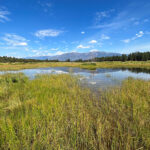Home »

Large mosquito larvae count this spring
Large numbers of mosquito larvae have been found in many areas around the City of Cranbrook so far this spring, but so far not many full adult mosquitos are out flying around – yet.

Significant numbers of mosquito larvae have been found over the past week in the Alkali Lake area of the Community Forest and in several other historical mosquito development sites around the city. Another large area that is a significant breeding ground for mosquitos, especially this year with the current flooding is Elizabeth Lake and the mosquito control contractor is monitoring the site closely.
The mosquito development sites have been and continue to be carefully monitored and treated with Aquabac. This larvicide contains a naturally occurring bacterium known as Bti, which targets mosquito larvae, but does not harm birds, mammals, beneficial insects or amphibians. This product is registered for this use in Canada. These sites are continually treated throughout the spring and summer.
However, effective mosquito control must combine the efforts of individual land/homeowners with those of the City of Cranbrook Mosquito Control Program. Residents are again reminded and strongly encouraged to stop mosquitoes before they start, by removing all sources of standing water from around your home. Some places to eliminate standing water include:
Clogged gutters;
Trays under flowerpots;
Outside pets’ dishes;
Children’s pools and toys;
Bird baths and feeders;
Canoes / boats;
Tires.
Residents are encouraged to call the Mosquito Hotline at (250) 421-1294 to report potential mosquito development sites or for more information regarding the Mosquito Control Program.
Site monitoring by the Mosquito Control Contractor’s staff is conducted on a continuous basis throughout the late spring and summer to determine the species, number and level of maturity of mosquito larvae present during this period. Mosquitoes go through four distinct stages of development during their life: egg, larvae, pupa and adult. Eggs are laid on the surface of standing water or on soil that is prone to flooding. When in contact with water during the spring and summer, the eggs hatch as larvae, which feed on plant material and quickly develop into pupae. The pupae then mature into adult mosquitoes, which emerge from the surface of the water. Following mating, adult females search for a blood meal to complete egg development.
City of Cranbrook







